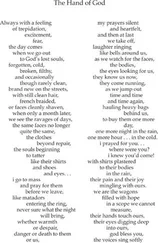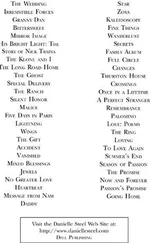Danielle Steel - Echoes
Здесь есть возможность читать онлайн «Danielle Steel - Echoes» весь текст электронной книги совершенно бесплатно (целиком полную версию без сокращений). В некоторых случаях можно слушать аудио, скачать через торрент в формате fb2 и присутствует краткое содержание. Год выпуска: 2005, ISBN: 2005, Издательство: Random House, Inc., Жанр: Старинная литература, на английском языке. Описание произведения, (предисловие) а так же отзывы посетителей доступны на портале библиотеки ЛибКат.
- Название:Echoes
- Автор:
- Издательство:Random House, Inc.
- Жанр:
- Год:2005
- ISBN:9780440240785
- Рейтинг книги:4 / 5. Голосов: 1
-
Избранное:Добавить в избранное
- Отзывы:
-
Ваша оценка:
- 80
- 1
- 2
- 3
- 4
- 5
Echoes: краткое содержание, описание и аннотация
Предлагаем к чтению аннотацию, описание, краткое содержание или предисловие (зависит от того, что написал сам автор книги «Echoes»). Если вы не нашли необходимую информацию о книге — напишите в комментариях, мы постараемся отыскать её.
Echoes — читать онлайн бесплатно полную книгу (весь текст) целиком
Ниже представлен текст книги, разбитый по страницам. Система сохранения места последней прочитанной страницы, позволяет с удобством читать онлайн бесплатно книгу «Echoes», без необходимости каждый раз заново искать на чём Вы остановились. Поставьте закладку, и сможете в любой момент перейти на страницу, на которой закончили чтение.
Интервал:
Закладка:
“Did they all die?” Amadea asked, as she saw her mother staring at the faded pictures. And then Beata looked at her strangely.
“No, I did.” She said nothing more then, and after a while Amadea went back to Daphne. She was a happy child of five, who thought the sun rose and set on her older sister. Amadea was like a mother to her.
After that first time when she took Amadea with her, Beata went back to the synagogue every year on Yom Kippur. It was the day of atonement, a time to contemplate past sins, and to allow God to judge you. She brought her children up as Catholics, and profoundly believed in what she taught them. But she still went to the synagogue once a year, and each time she went she watched them. Her whole family. They were always there, the men seated separately from the women. And each year, she took Amadea with her. She never told her why. It was too complicated, she felt, after all this time. She and Antoine had always told her their families were dead. Beata didn't want to admit she'd lied. And as part of all that, she never told either of her daughters she had been Jewish years before.
“Why do you want to go there?” Amadea asked her, intrigued by it.
“I think it's interesting, don't you?” Beata never offered any further explanation, and Amadea admitted to her best friend when she was fifteen that she thought it was creepy. But there was no question in Amadea's mind, ever since her father's death five years before, her mother hadn't been normal. It was as though the shock had been too much for her, and Amadea sensed correctly that she wanted to be with him. She was only thirty-eight, and still beautiful, but she was waiting to die now, and Amadea knew it.
When Amadea was sixteen, Daphne was eight, and that year Amadea had promised to take Daphne to her ballet class on the one day of the year that her mother went to the synagogue, on Yom Kippur. She was relieved to have an excuse not to go. She didn't know why, but she always found it depressing. She much preferred joining her mother in church, and lately Amadea had been praying to know if she had a vocation, like her friend's sister. She hadn't said anything to anyone but she was beginning to think so.
Beata took her place in the synagogue, as she always did, heavily veiled. And as she did each year, she saw them. She knew she could have gone at other times, but this always seemed the right day, to beg for their forgiveness and her own. She thought her mother looked frail this time when she saw her. And by some miracle, she found herself sitting in a seat just behind her. If she had dared to, she could have reached out to touch her. And then, as though by a miracle, sensing Beata's eyes glued to her, she turned and glanced at the woman behind her. All she could see was a hat and a veil, but she sensed more than saw something familiar about her. And before she could turn away again, Beata lifted the veil, and her mother saw her. Their eyes met and held for an endless moment, and then her mother nodded and turned away again, looking transfixed. She was sitting alone, among the women. And when they left the synagogue, Beata fell into step beside her. She had no sense this time that her mother wanted to avoid her. And what had struck Monika and took her breath away was the bottomless sadness in the eyes of her daughter. The two women left the synagogue side by side, and as they did, their hands brushed and met. Beata gently took her hand in her own and held it, and her mother let her. And then without a word, her mother went to join her father. He still looked tall and proud, Beata saw, although he was much older. She knew that he was sixty-eight, and her mother sixty-three. She watched them leave the synagogue, and then Beata took a taxi home to her daughters.
“How was it?” Amadea asked her that night at dinner.
“How was what?” Beata asked blankly. She rarely spoke at dinner, and tonight she looked particularly distracted. She was still thinking of her mother. They hadn't spoken in seventeen years now, and so much had happened. Her daughters had been born, her husband had died, everything in her life had changed, and she had become a countess, which meant nothing to her, although she suspected it might have impressed her sister.
“Isn't today the day you go to the synagogue every year? Why do you do that, Mama?” She knew that her mother had been deeply intellectual, and she had always had a profound fascination with religion. Perhaps it was religious curiosity that drove her there, or a gesture of respect for other people. She knew how devoutly Catholic her mother was.
“I like it.” She did not tell her oldest daughter that she went there to see her mother, and today she had touched her. They had not spoken a single word to each other, but just holding her hand for a moment had revived her. Since Antoine had died, she knew to her very core that she needed to see her mother. It was some sense of continuity from the past into the future. Monika was the link for her, as Beata was between her mother and her daughters.
“I think it's disgusting that Jews can't be newspaper editors or own land anymore. And that some of them are being sent to work camps,” Amadea volunteered at dinner with a look of outrage. Hitler had been appointed chancellor in January, and ever since then there had been laws passed against the Jews. Beata had been aware of it, as most people were, and thought it disgraceful, but there was nothing anyone could do to stop it. And as most people did, she had her own problems and worries. But the current anti-Semitism was of great concern to her for a number of reasons.
“What do you know about that?” Beata looked startled.
“I know a lot about it actually. I went to some lectures by a woman called Edith Stein. She said that women should become involved in politics, their community, and the nation. She wrote to the pope, condemning anti-Semitism. And I read her book about Life in a Jewish Family. She was born Jewish, and became a nun recently. She became a Catholic eleven years ago, but the Nazis still think of her as Jewish. They forced her to stop lecturing and teaching. Now she's in a Carmelite convent in Cologne. She's actually very famous.”
“I know. I've read about her. I find her interesting.” It was the first bond Beata and her daughter had made, on an adult level, the first serious conversation they'd had in years. Amadea was encouraged by it, and decided to open her heart to her. She was impressed that her mother knew of Edith Stein, too.
“Sometimes I think I'd like to be a nun. I spoke to a priest about it once. He thought it would be good.” Beata looked upset as she glanced at her daughter. For the first time, she realized how absent she had been, and how lonely Amadea was. Other than her friends at school, her only companion at home was a child half her age. It was a wake-up call to Beata to pay more attention to her. Antoine had been gone for six years, and Beata felt as though she had died with him.
“Your father wouldn't like it if you became a nun.” She remembered what he had said when the priest who had married them said that she should have become a nun. Antoine had strongly disapproved, not only for her obviously, but he thought it was a wasted life for women. He thought women should be married and have children. “You should get married when you grow up, and have babies.” She tried to echo Antoine's words, as though she could speak for him, and in fact had an obligation to do so, since he could no longer speak for himself.
“Maybe not everyone is meant to have children. Gretchen's sister became a nun three years ago. She loves it. She took her first vows last year.” The more Beata listened to her, the more she realized how out of touch she had been. Amadea sounded as though she were heading for the nearest convent, and Beata realized she had a responsibility to pay closer attention and talk to her, not just about taking Daphne to ballet, or dropping her off at school, but about the things that mattered to her. She hoped it wasn't too late to make that connection with her again. Beata realized with sudden shock that she had been drifting aimlessly since Antoine's death, and had all but lost touch with her children. Her body was there, but her spirit wasn't.
Читать дальшеИнтервал:
Закладка:
Похожие книги на «Echoes»
Представляем Вашему вниманию похожие книги на «Echoes» списком для выбора. Мы отобрали схожую по названию и смыслу литературу в надежде предоставить читателям больше вариантов отыскать новые, интересные, ещё непрочитанные произведения.
Обсуждение, отзывы о книге «Echoes» и просто собственные мнения читателей. Оставьте ваши комментарии, напишите, что Вы думаете о произведении, его смысле или главных героях. Укажите что конкретно понравилось, а что нет, и почему Вы так считаете.











